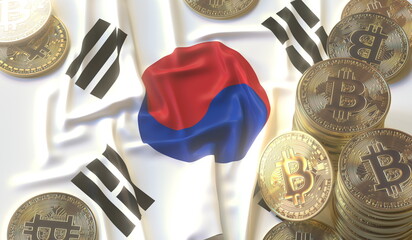
The recent surge in Bitcoin prices has reignited the cryptocurrency trading frenzy in South Korea, with transaction volumes on local crypto exchanges surpassing those of the country’s stock market last week. Reports from local media highlight that trading volumes on South Korean cryptocurrency exchanges hit a record 11.8 trillion Korean Won (approximately $9 billion USD) on Sunday, eclipsing the 11.47 trillion Won ($8.7 billion USD) trading volume of the South Korean stock market recorded on Friday.
Breakdown of Trading Volumes
This unprecedented volume encompasses the combined transactions from South Korea’s five largest Won trading platforms, namely Upbit (8.8 trillion Won), Bithumb (2.7 trillion Won), Coinone (176.4 billion Won), Gopax (55.2 billion Won), and Korbit (32 billion Won). The most actively traded crypto pairs on Upbit were Bitcoin (BTC), Space ID (ID), IQ Protocol (IQ), 0x (ZRX), and Shiba Inu (SHIB), reflecting a diverse interest among traders.
Increasing Risk Appetite
Market analysts suggest that the substantial volume in the crypto market reflects an increasing risk tolerance among Korean investors. Ki Young-Ju, the founder of on-chain analytics provider CryptoQuant, attributes this trend to Koreans’ preference for high-risk, high-return investments, fueled by historical economic growth and a widening wealth gap. Altcoins, in particular, are favored over major assets like Bitcoin (BTC) or Ethereum (ETH) as the vehicle of choice for these high-stake investments.
The Kimchi Premium Phenomenon
Despite the global parity of Bitcoin, Ether, and other tokens, they trade at a higher price on Korean exchanges, signifying robust retail demand. This disparity, known as the “Kimchi premium,” is at its peak since the Luna crash in May 2022. According to Bradley Park, head of research at CryptoQuant, this premium is a clear indicator of strong retail demand within the Korean market, with investors willing to pay more for Bitcoin.
Upbit’s daily trading volume has remained elevated since March, further underscoring the momentum of retail inflow into the market. The Kimchi premium essentially represents the price difference between Bitcoin on Korean exchanges versus global platforms, currently standing at a 10% premium. This creates an arbitrage opportunity, albeit with operational complexities, involving the purchase of Bitcoin on international exchanges and selling on Korean platforms for profit.
Snapshot of South Korea’s Crypto Trading Frenzy
| Aspect | Detail |
|---|---|
| Record Trading Volume | 11.8 trillion Won ($9 billion USD) on crypto exchanges |
| Comparison to Stock Market | Surpassed stock trading volume of 11.47 trillion Won ($8.7 billion USD) |
| Leading Exchanges | Upbit, Bithumb, Coinone, Gopax, Korbit |
| Popular Crypto Assets | BTC, ID, IQ, ZRX, SHIB |
| Market Trend | Increased risk tolerance, preference for high-return investments |
| Kimchi Premium | 10% price premium of Bitcoin in South Korea |
The resurgence in Bitcoin’s price has catalyzed a significant shift in South Korea’s investment landscape, with cryptocurrency trading volumes overtaking those of the traditional stock market. This shift underscores a growing fascination with digital assets, driven by an appetite for high-risk investments and a vibrant retail demand. As the “Kimchi premium” illustrates the willingness of Korean investors to pay more for cryptocurrencies, the market dynamics in South Korea offer a unique glimpse into the global impact of cryptocurrencies and the operational intricacies of cross-border arbitrage.
Featured image credit: Alexey Novikov via Adobe Stock
